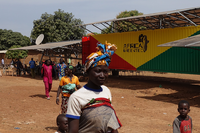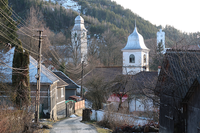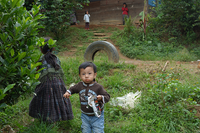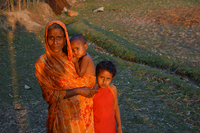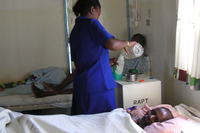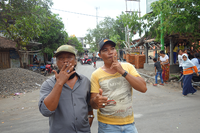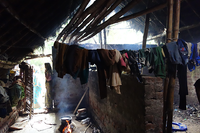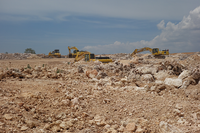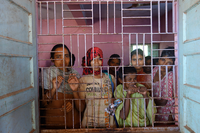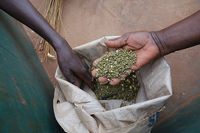CURRENT TOPICS
Climate Heroes
How people are saving the climate worldwide: with solar pioneering, agroforestry and fight for water. Examples from Mali, Niger, Bolivia, Scotland and the Philippines. For details listen to Thomas Kruchem’s Deutsche Welle English radio documentaries on Bolivia https://www.dw.com/en/world-in-progress-bolivias-water-woes/av-49537665 and Haitihttps://www.dw.com/en/world-in-progress-haitis-ecological-farmers/av-49150851 .
Red carpet for investors
More and more foreign investors are suing governments before dubious international tribunals. The "investor-state dispute settlement", which, at times, endangers human rights, environment and climate, involves billions of euros in damages for alleged state misconduct. Currently, insiders expect a wave of lawsuits because of government measures against the corona virus. More details in Thomas Kruchem’s radio documentary (English) for Deutsche Welle https://www.dw.com/en/world-in-progress-intransparent-arbitration-courts-harm-taxpayers-foreign-investors-law-government/av-54368245 .
At the drip of Big Food
How food companies are conquering the South and making poor people sick. While two billion people suffer from malnutrition to date, more and more citizens of poor countries consume unhealthy junk food made of sugar, flour, fat and salt. The number of overweight children and diabetics is growing rapidly. Despite this, the transnational food industry is marketing its junk food more and more aggressively, using UN institutions, NGOs and science. For more details see Thomas Kruchem's book on the issue (German) https://www.amazon.de/Tropf-von-Big-Food-Lebensmittelkonzerne/dp/3837639657/ref=sr_1_1?__mk_de_DE=%C3%85M%C3%85%C5%BD%C3%95%C3%91&dchild=1&keywords=kruchem+food&qid=1598891182&sr=8-1 .
Total surveillance?
Opportunities and threats of digital identity. Corporations and governments intend to equip everyone with a digital identity - based on biometric data such as fingerprints, iris and face scans. This identity brings together a vast amount of data: Birth certificate, school and work references, health data, criminal record; credit card usage, travel and even activities registered by smartphones.
Theoretically, digital identity should enable us all to deal with government and business contacts easily and without fear of hackers. Refugees stranded in foreign countries should also be able to prove their identity and apply for asylum without any problems, and children without birth certificates should be entitled to vaccinations and schooling. By means of blockchain technology, the identity data will be stored tamper-proof on numerous servers worldwide; everyone will be able to decide for themselves to whom they disclose which data. Critics look upon digital identity as an instrument of total surveillance. Results of the research will be published shortly.
What’s healthy is determined by Bill Gates
The World Health Organization in crisis. The binding membership fees of the WHO have been frozen for decades. 80 percent of the WHO budget today comes from voluntary contributions. The largest donor, apart from the USA, is the Bill and Melinda Gates Foundation (BMGF). It supports almost exclusively the fight against infectious diseases – with, sometimes, problematic vaccination campaigns. The BMGF does almost nothing against the pandemic of non-communicable diseases (NCDs), which are, to a big degree, caused by the alcohol and junk food industry. For good reasons: The foundation earns a large part of its money with shares of food, beverage, alcohol and pharmaceutical companies. Serious conflicts of interest also affect other international health institutions such as the GAVI Vaccination Alliance and the Global Fund to Fight AIDS, Tuberculosis and Malaria. More in Thomas Kruchem's DLF radio documentary https://www.deutschlandfunkkultur.de/weltgesundheitsorganisation-am-bettelstab-das-dilemma-der.976.de.html?dram:article_id=385853 .
Addictive drugs
Tobacco and alcohol in poor societies. In most industrialized countries tobacco consumption is declining; alcohol consumption is stagnating on a high level. In poor countries in Africa and Asia, however, transnational addiction companies such as British American Tobacco, Philip Morris, ABInbev and Heineken are aggressively d eveloping new markets. Two thirds of Indonesian men now smoke. In some regions of South Africa, one in four babies suffers from fetal alcohol syndrome. What can the international community and affected governments do? For details listen to Thomas Kruchem’s Deutsche Welle radio documentary (English) on Alcohol in Africa and his Deutsche Welle documentary (English) on Tobacco in Indonesia https://www.dw.com/en/world-in-progress-why-indonesia-is-a-target-for-tobacco-companies/av-52843937 .
Killer in the kitchen
On the fight against domestic air pollution in developing countries. Almost three billion people in poor countries still cook and heat with open fires in their huts. Exhaust gases and particulate matter from burnt wood, dung, coal and kerosene poison the air they breathe; many children suffer burns; four million women die every year from domestic exhaust fumes. What realistic alternatives are there? For more information listen to Thomas Kruchem’s SWR radio documentary (German).
Water or Gold
On the struggle between mining and ecology. Conflicts between mining, on the one hand, and human rights and environmental protection on the other are intensifying worldwide. Three examples: In the páramo de Santurbán, a high moor in Colombia, international corporations want to mine gold. Because this threatens the water supply of the city of Bucaramanga, its citizens are resolutely resisting. Similarly, Romanian activists are resisting in Romania's Carpathian Mountains, where a Canadian company wants to destroy a village with an open cast gold mine and build a huge cyanide dump. Meanwhile, in Indonesia farmers are resisting the idea that cement companies are mining limestone in a protected karst. This, they say, would destroy water resources that agriculture needs to grow rice. For more details listen to Thomas Kruchem’s SWR radio documentary on Colombia and Indonesia (German) https://www.swr.de/swr2/wissen/swr2-wissen-2020-02-18-100.html and his Deutsche Welle documentary (English) on Indonesia https://www.dw.com/en/world-in-progress-farmers-agains-cement-factories-in-indonesia/av-51755119 .
Chain people
On the situation of the mentally ill in developing countries. Millions of mentally ill people in Africa and southern Asia languish in an inhumane manner - hidden in dark huts or chained to trees by overstrained relatives. Governments devote barely one percent of their health budget to mental health, and development aid is scarcely concerned. One example: India. For details, listen to Thomas Kruchem’s SWR radio documentary (German).
Spoiled Food
Post-harvest losses and aflatoxins in Africa and Central America. In developing countries, up to 60% of cereals, fruit and vegetables spoil after harvest - the result of errors in storage, transport and processing. In addition, there is a widespread contamination of, in particular, corn with aflatoxins. They cause a third of all liver cancers worldwide and chronic malnutrition in children. Governments and international development cooperation are still doing far too little about this – as Thomas Kruchem has seen in Kenya and Guatemala. For details listen to his SWR radio documentaries (German) on post-harvest losses https://www.swr.de/swr2/wissen/broadcastcontrib-swr-11372.html and aflatoxins https://www.swr.de/swr2/programm/broadcastcontrib-swr-31770.html .
Interested in an article or lecture?
Write a mail or call us!
✆ +49 (0) 178 16 80 55 5
✉ info@kruchem.info
